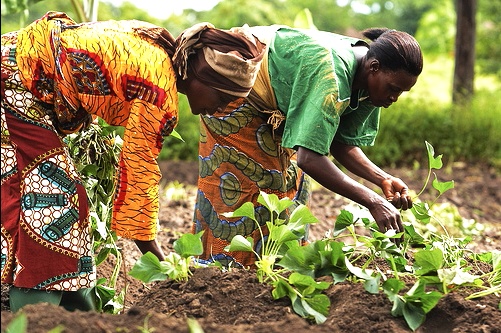Women Farmers Kick Against Gender Based Violence In Agriculture
By Ene Okwanihe, Abuja
Women farmers in Nigeria have called for an end to Gender Based Violence (GBV) to enable women access their farms without fear of attacks, produce food and support the government’s food security drive.
The women under the auspices of the Nigerian Women for Agriculture Progressive and Development Initiative, (NWARPDI) made the call at a one-day train the trainer seminar in Abuja Nigeria’s capital with the theme, “Unite! Invest in to Prevent Violence Against Women and Girls”.
Speaking on the topic “Preventing Violence against Women and Girls in Nigerian Agriculture” the National Coordinator of NWARPDI Farmer Omolara Svensson said women make up 86% of the agricultural workforce in the country and they face all sorts of harassment, violence and exploitation.
She noted that NWARPDI is using the opportunity of the global 16 days of activism against gender-based violence to focus on preventing violence against women and girls in the agricultural sector.
“This year, our focus within NWAPDI is clear. Preventing violence against women and girls in the agricultural sector. In Nigeria, women make up 86% of the agricultural labor force”
“Yes, yet, many face harassment, violence, and exploitation as they strive to feed our great nation. This violence occurs in the fields, at the marketplace, in homes, and spaces where women should feel safe and supported. Let us call this what it is, an assault on human rights, an affront to gender equality, and a barrier to national development”.
According to her, ending GBV needs more than just words, she said it needs commitment, financing, backed up policies and creating awareness to reduce the vulnerability of abuse.
“Preventing violence requires more than just words.
It demands resources. It demands commitment and action. NWAPDI is calling on all stakeholders, government agencies, civil society organizations, the private sector, individuals to prioritize these issues”
“Invest in safe spaces. Women in agriculture need safe environments where they can report abuse, receive support, and rebuild their lives. Strengthen policies and enforce gender-based violence laws must not just exist on paper but be actively enforced in rural communities”.
She stated that when women are silenced, the agricultural communities lose their voice, their innovations, and their potentials and it undermines productivity, food security, and rural development.
“A woman who feels safe and supported can plant more crops, right? Innovate new techniques and uplift her entire community. But a woman living in fear cannot thrive. And when she suffers, we all suffer”
“One of the major reasons why we are all hungry at the moment. NWAPDI stands firm in the belief that no woman should be forced to choose between feeding her family and protecting herself from harm. This year’s campaign, Lighting the Way for Change, as part of the 16 Days Activism, NWAPDI is hosting this training across Nigeria”.
Lending her voice to the call, the guest speaker at the seminar, a lecturer, professor Faith Ibrahim in her lecture titled “Emphasising the urgent need for resources, support, and preventive action to address gender -based violence GBV affecting women and youth in Nigeria’s Agricultural sector” outlined some of the interventions needed to support the course.
She said Resource Allocation for Victims of Gender-Based Violence, Economic and Educational Empowerment, Support Mechanisms, Preventative Actions and Community Engagement and Collaboration across Sectors are some of the areas of interventions that could help women cope in the face of GBV and prevention.
The event organized by NWARPDI and other partners is in commemoration of the global 16 days of activism against gender-based violence.
A campaign that spans from November the 25th to December 10th, to remind us that the issue of GBV is urgent, pervasive, and demands collective action.
Oyenike Oyeniyi


Comments are closed.